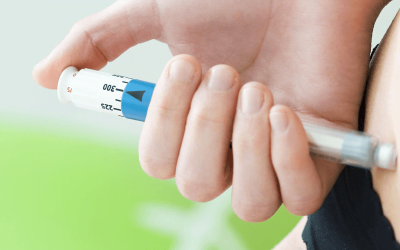Male Infertility Treatment Centre in Delhi

Male infertility can result from low sperm production, abnormal sperm function, obstruction to the passage of sperm, and erectile dysfunction.
Here are the various reasons for male infertility:
Hormonal problems:
There is an imbalance of male reproductive hormones.
Physical causes:
These disturbs the sperm production and blockage of the ejaculatory pathway. It may be caused by infections, injury etc.
Sexual problems:
The physical and psychological problems – erectile dysfunction, early ejaculation and inability to ejaculate are examples of intercourse problems.
Environment & lifestyle:
Males exposed to hazardous substances in their workplace – chemicals, insecticides, adhesives, silicones and radiation, occupations requiring prolonged sitting (such as driving) or being exposed to high temperatures (such as bakeries) affects the sperm production.
Alcohol consumption, smoking, repeated use of drugs such as cocaine and cannabinoids damages the sperm DNA and affects the sperm quality.
Genetic factors:
These can be grouped into two categories – chromosomal abnormalities and single-gene mutations.
Our clinic is a renowned male infertility clinic for providing excellent treatment for men. In our clinic, we provide highly reliable, advanced medical treatments and basic infertility workup in males by providing the following facilities:
History and General physical examination:
This includes complete medical and surgical history, sexual, personal and social history.
Semen analysis:
It is a routine test to assess the sperm parameters. Semen is collected by masturbation in sterile containers.
Scrotal doppler ultrasound:
This is to assess the problems of male reproductive organs such as testicular volume, varicocele, hydrocele etc.
Hormonal levels:
Hormones produced by the pituitary gland, hypothalamus and testicles help in sexual development and sperm production. Abnormalities in these lead to male infertility. A simple blood test measures the level of hormones – FSH, LH, prolactin, thyroid, testosterone and estradiol.
Post-ejaculation urinalysis:
Sometimes sperms are present in urine which indicate that they are travelling backward into the bladder instead of coming out of penis during ejaculation (retrograde ejaculation).
Genetic tests:
When sperm concentration is extremely low or absent, there could be a genetic cause. Genetic testing including karyotype can diagnose various congenital or inherited syndromes.
Testicular biopsy:
This test involves taking testicular tissue samples from the testicle to check for sperms.
Symptoms of male infertility
Male infertility can be a complex issue, with various factors contributing to it. It’s essential to identify the symptoms early for prompt intervention and successful treatment.
Some causes of male infertility are evident through specific symptoms, such as ejaculatory issues, poor sperm motility, and low sperm count, which may signal problems with sexual function. It’s important to be vigilant about these signs and consult a fertility specialist promptly if you notice any.
Symptoms indicating male infertility
Sexual function issues –
Difficulties in sexual function, such as problems with ejaculation, reduced sexual desire, and trouble maintaining an erection, can be indicative of underlying issues.
Testicular problems –
Pay attention to any lumps, swelling, or pain in the testicles. While these symptoms are often benign, they can sometimes signal more serious conditions. Common issues include:
- Varicoceles – Enlarged veins in the scrotum.
- Epididymal Cysts – Fluid-filled lumps in the epididymis.
- Hydroceles – Swelling due to fluid accumulation.
- Epididymo-orchitis – Inflammation of the testicles and epididymis.
- Inguinal Hernias – Protrusion of tissue through the groin area.
Severe, sudden pain in the testicles could indicate testicular torsion, a serious condition requiring immediate medical attention. Also, while rare, testicular lumps can be a sign of testicular cancer, warranting prompt medical evaluation.
Recurrent respiratory issues –
Recurring respiratory infections can be a symptom of Kartagener’s Syndrome, a genetic disorder affecting both males and females. This syndrome is characterised by a specific defect in the movement of cilia and tiny hair-like structures in the respiratory tract and other organs. While the cilia defect can lead to chronic respiratory problems and potentially impact sperm motility in males, it doesn’t always result in infertility.
Anosmia –
The inability to smell (or anosmia) may be a rare symptom of infertility, potentially pointing to Kallmann Syndrome, which affects sexual development. Kallmann Syndrome is a condition where the failure to undergo puberty is coupled with anosmia. This is due to a deficiency in certain hormones that are crucial for sexual maturation and the development of the sense of smell.
Low sperm count –
One of the common causes of male infertility is a low sperm count, defined as fewer than 15 million sperm per millilitre of semen or less than 39 million per ejaculate. Factors contributing to low sperm count include health issues, environmental factors, and lifestyle choices.
Gynecomastia –
Abnormal breast growth in men can suggest hormonal imbalances affecting sperm production. This condition reflects an imbalance between estrogen and testosterone levels in the body. Not only can it impact physical appearance, but it also can be indicative of underlying health issues that may affect fertility.
Decreased body or facial hair –
A lack of body or facial hair can indicate hormonal issues or chromosomal abnormalities. This symptom often points to a deficiency in hormones like testosterone, which plays a crucial role in male secondary sexual characteristics and reproductive function.
Other factors that affect male fertility
In addition to lifestyle factors, stress, and infections, causes of male infertility can include hormonal imbalances and physical obstructions. Trauma to the testes, cancer treatments like radiation and chemotherapy, and surgeries involving the testicles can also contribute to infertility.
Certain medications and supplements can impact fertility as well. These include antibiotics, antifungal or antiparasitic drugs, antidepressants, anti-anxiety medications, and drugs for cardiovascular and gastrointestinal conditions. The use and abuse of opiates and narcotics are also known to decrease sperm quality.
Causes of male infertility
Male infertility can be attributed to various factors, both medical and lifestyle-related. Understanding the potential causes is crucial for diagnosis and treatment. Here are some common causes of male infertility:
Low Sperm Count:
A low sperm count means that there are too few sperm in the ejaculate, reducing the chances of fertilising an egg.
Poor Sperm Motility:
Sperm needs to be able to swim effectively to reach and penetrate the egg. Poor sperm motility hinders this process.
Ejaculatory Problems:
Conditions such as retrograde ejaculation, where sperm is redirected into the bladder instead of exiting the penis, can cause male infertility.
Obstructions:
Blockages in the reproductive tract, such as the vas deferens, can prevent sperm from being ejaculated.
Hormonal Imbalances:
Hormonal disorders, including low testosterone levels, can affect sperm production and maturation.
Varicocele:
A varicocele is an enlargement of the veins within the scrotum and can raise the temperature in the testicles, adversely affecting sperm production.
Infections:
Sexually transmitted infections (STIs) or other infections in the reproductive system can damage sperm production and quality.
Chronic Illness:
Conditions like diabetes or cystic fibrosis can impact male fertility.
Medications:
Some medications, like certain antihypertensives or antidepressants, may interfere with sperm production.
Lifestyle Factors:
Unhealthy habits, including excessive alcohol consumption, smoking, recreational drug use, and obesity, can contribute to male infertility.
Stress:
High levels of chronic stress may affect hormonal balance and sperm production.
Consult with Dr. Kaberi Banerjee, best male infertility specialists providing best infertility treatment for male in Delhi with a high success rate.
For further queries related to the treatment, Please call +91-9871250235 or write to contact@advancefertility.in
Common causes of male infertility include low sperm count, poor sperm motility, structural issues in the reproductive organs, hormonal imbalances, and genetic factors. These factors can impact a man’s ability to contribute to conception.
The diagnosis of the causes of male infertility at Advance Fertility involves a comprehensive evaluation, including semen analysis, hormonal testing, genetic screening, and imaging studies. This thorough assessment helps our experts identify specific factors contributing to male infertility.
Yes, hormonal imbalances can contribute to male infertility. Treatment at Advance Fertility may include hormonal therapies to correct imbalances, enhance the ability of the reproductive system, and increase the likelihood of a healthy pregnancy.
Lifestyle factors like smoking and excessive alcohol consumption can negatively impact male fertility by reducing sperm quality and quantity. Changes in lifestyle may be suggested at Advance Fertility to enhance general reproductive health and raise the likelihood of a successful conception.
Advance Fertility offers a range of fertility treatments for individuals with male infertility, including lifestyle modifications, medication, intrauterine insemination (IUI), in vitro fertilization (IVF), and intracytoplasmic sperm injection (ICSI). Treatment plans are customised based on the specific needs of each individual.






